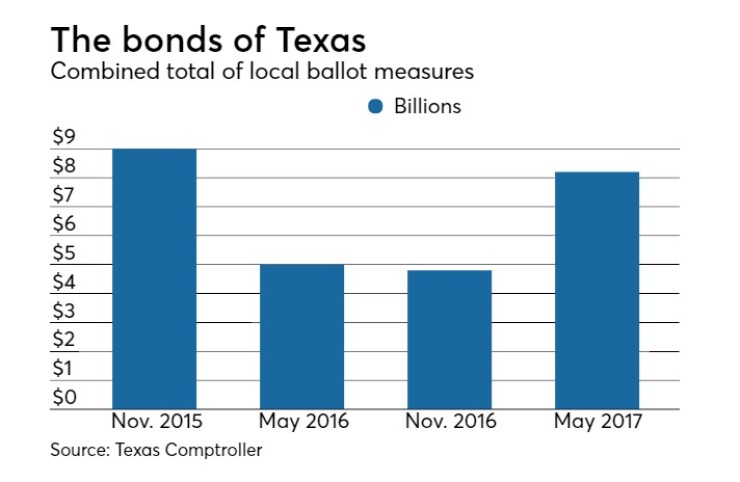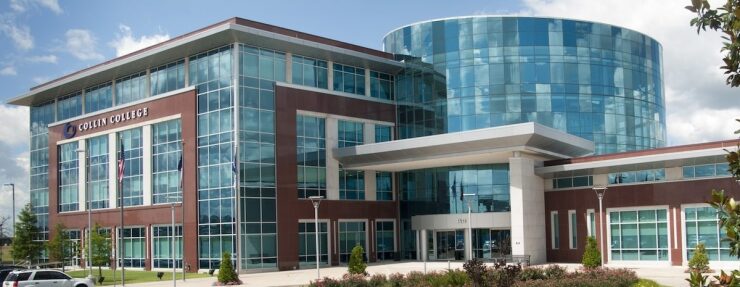DALLAS – Voters across Texas will consider $8.2 billion of local bond proposals on May 6, one of the largest totals in recent years.
The 70 proposals include $5.8 billion of school construction bonds, $1.4 billion for cities and counties, and $1 billion for community college districts, according to figures from Texas Comptroller Glenn Hegar.
“These elections often don’t get much attention, especially in odd-numbered years when there isn’t much on the ballot,” Hegar said. “We want to make sure voters have the information they need to make smart choices when it comes to their local finances.”

The combined bond proposals are the highest amount since November 2015, when about $9 billion appeared on the ballot. In the presidential election last November, about $4.8 billion of bonds were proposed amid expectations of a record voter turnout. A year ago, voters considered about $5 billion of local bonds.
Early voting on the proposals began Monday. In addition to the bond proposals, voters will elect city and school board officials.
In San Antonio and surrounding Bexar County, voters face one of the largest bond ballots in years, including a record $850 million of bonds for the city and $450 million for the Alamo Community College District.
San Antonio’s bond proposals include financing to redevelop Hemisfair Park, site of the 1968 World's Fair.
The package would provide a new civic park that will anchor the ongoing redevelopment of Hemisfair, a concept that has been under discussion for nearly 50 years.
"After almost 50 years of indecision, the city of San Antonio is united (and) taking action to transform Hemisfair into the urban parks district it deserves to be," Hemisfair Park Area Redevelopment Corp. CEO Andres Andujar said in a statement.
Created by the city council in 2009, the nonprofit corporation is charged with overseeing redevelopment of the park in the heart of the city.
The Hemisfair District is being rebuilt in phases, with phase one expected to open in 2018 in time for the city's tricentennial. By 2020, the Civic Park is expected to be completed.
A large community college district in Collin County north of Dallas is seeking $600 million of bond authority.
The district’s bond measure would fund future campuses in Wylie, Farmersville and Celina, according to Ken Lynn, Collin College chief financial officer. The bond will also fund a technical center and other college programs.
Lynn said that passage of the bond proposal would not mean the college will use the entire amount.
Also in Collin County, the rapidly growing Dallas suburb of Plano is asking voters for $225 million of bond authority. Local city and school districts in the county have been seeking so many bonds in recent years to keep pace with growth that some officials fear “voter fatigue” in this election.
In Frisco Independent School District in Collin County, nearly 60% of voters rejected a 13-cent tax increase to support operations last August. The school board is now contemplating a $30 million cutback in spending in the district, which is one of the fastest growing in the state.
To the west of Collin County, the Lewisville ISD in Denton County north of Dallas is proposing the largest school bond issue in the state at $737 million. Bond approval would trigger a tax increase to as high as 44.84 cents. The bond debt tax before 2016 had been 43.673 cents, but was reduced to 38 cents in 2016 because the district had refinanced some of the prior bonds issued, saving interest payments, and reducing the amount needed to cover those payments.
Previous LISD bond issues in 2005 and 2008 were $199.5 million in 2005 and $697.7 million in 2008.
Other fast-growing suburbs around Austin and Houston are also seeking bond authority for schools and infrastructure.
In the Austin suburb of Round Rock, home of Dell Computer, a local taxpayer group is opposing a record $572 million bond proposal for the school district.

"There's much more wrong with this bond package than simply a huge price tag,” according to Pat McGuiness, representative of the Round Rock Parents & Taxpayers Association, citing “misplaced and questionable priorities, wasteful items priced excessively, lack of proper project planning and vetting and worse."
However, bond backers and the local Chamber of Commerce have pushed hard for the proposal, saying it is urgently needed.
In the Clear Creek ISD near Houston, Tea Party-style taxpayers have voiced opposition to some of the $487 million of bonds on the local ballot.
The CCISD bond proposal is expected increase taxes by 3.7 cents per $100 assessed value, which would mean around $6 more monthly in taxes on a home with the median value of $223,635.
One opposition group, the Citizens for CCISD political action committee, claims the district is overspending, while another group, the Galveston County Republican Party sought to postpone the election until November.
The school bond elections come as the Texas Legislature is considering pushing more of the cost of operating school districts to the local level, lowering property taxes and subsidizing vouchers for private schools with local property tax revenues.
The Texas Senate’s version of the state budget bill cuts state funding for public schools by $1.8 billion in general revenue and uses local property tax revenue to make up the difference.
However, in the Texas House, representatives last week voted 134-16 to provide an additional $1.6 billion for public schools, simplify the complex formulas for allocating that money and add funding for certain disadvantaged student groups.
Once the House completes its work on the budget, a committee of senators and representatives will work to reconcile the two versions.





